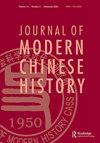The search for a new republic: a study on thoughts and activities of Zhang Dongsun at his early age (1886-1932)
IF 0.1
4区 历史学
Q4 HISTORY
引用次数: 0
Abstract
intellectual history. In addition to modern Chinese magistrates as a group, the author also examines individuals at high, middle, and lower ranks within the judicial system, such as Tang Xuan, Huang Zunsan, Shen Jiaben, Yu Shaosong, Xie Jian, Dong Kang, and Xu Shiying. By integrating individuals with groups, he responds to the problem of the disappearance of the individual caused by trends towards making historical studies more scientific, and he explores how to return the individual to our studies of legal history and modern history. The discussion in this book focuses on the “old” and the “new” approaches to cultivating modern Chinese magistrates, the institutional reforms in the late Qing period and magistrates as a group, Shen Jiaben’s experience and feelings in the first year of the Republican period, the division and reorganization of magistrate groups after the Revolution of 1911, the connections within legal circles during the Beijing government years, and the period of change and the choices made by legal professionals. Different chapters are well integrated in this book, though each of them uses important historical documents to focus on a particular topic. Hence this book offers in-depth discussions of various issues and yet maintains the unity and integrity of an academic monograph. In theory, magistrates as a group were supposed to function as a stabilizing force in modern China, and this was supposedly reflected in the stability of the group itself. In fact, this was seldom the case. The magistrates lived in a time of change, and their role was not necessarily to resolve social disputes and maintain the existing social order. Instead, many of them also became reformers striving for a modern nation-state. The author mentions that in modern Chinese history, magistrates actually played multiple roles. They were involved in constructing a modern nation-state, changing the social customs, and maintaining the existing social order. By using specific cases, he demonstrates not only the difficulty of balancing these roles, but also the contradictions they entailed and the serious conflicts that ensued, a situation that created many legal and judicial problems. In this period of change, construction and transformation were absolute, and the maintenance of what was left unchanged was relative. Modern Chinese magistrates can be perceived as “reformers maintaining the order.” (226) It should be mentioned that this book does not pay enough attention to the judicial work of the magistrates, and consequently, there is still room for further research. Future research should attach importance to judicial documents, such as decisions and indictments.对新共和的探索:张东荪早年思想活动研究(1886-1932)
历史知识。除了作为一个群体的中国现代裁判官之外,作者还考察了司法系统中高、中、低层的个人,如唐璇、黄遵三、沈家本、于少松、谢坚、董康和徐世英。通过将个人与群体结合起来,他回应了历史研究科学化趋势所导致的个人消失的问题,并探索了如何将个人回归到我们的法律史和现代史研究中。本书主要论述了中国近代裁判官培养的“旧”与“新”途径、清末的制度改革与裁判官群体、沈家本在民国元年的经历与感受、辛亥革命后裁判官群体的分裂与重组、北京政府年间法律圈内的联系,以及中国近代裁判官培养的“新”与“旧”途径。以及变革时期和法律专业人士做出的选择。不同的章节很好地整合在这本书中,尽管每个章节都使用重要的历史文献来关注一个特定的主题。因此,本书对各种问题进行了深入的讨论,但仍保持了学术专著的统一性和完整性。从理论上讲,在近代中国,地方官作为一个群体应该发挥稳定力量的作用,这应该反映在群体本身的稳定上。事实上,这种情况很少发生。裁判官生活在一个变化的时代,他们的角色不一定是解决社会纠纷和维持现有的社会秩序。相反,他们中的许多人也成为了争取建立现代民族国家的改革者。笔者提到,在中国近代史上,地方官实际上扮演着多重角色。他们参与了现代民族国家的建设,改变了社会习俗,维护了现有的社会秩序。通过具体的案例,他不仅说明了平衡这些角色的困难,而且说明了它们所引起的矛盾和随之而来的严重冲突,这种情况造成了许多法律和司法问题。在这个变革时期,建设和改造是绝对的,保持不变是相对的。现代中国的地方官可以被看作是“维持秩序的改革者”。(226)应当指出的是,本书对裁判官的司法工作关注不够,因此仍有进一步研究的余地。今后的研究应重视对判决书、起诉书等司法文书的研究。
本文章由计算机程序翻译,如有差异,请以英文原文为准。
求助全文
约1分钟内获得全文
求助全文

 求助内容:
求助内容: 应助结果提醒方式:
应助结果提醒方式:


